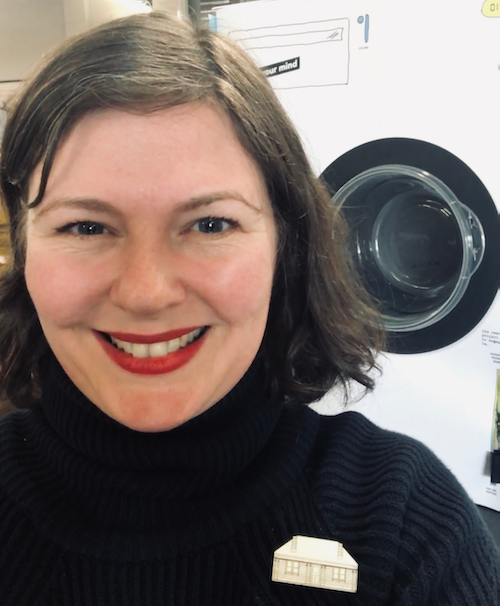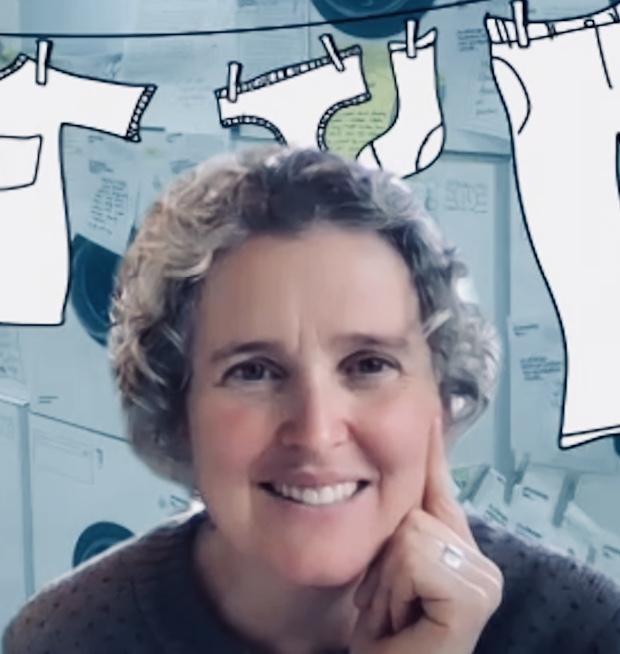People
The science communication laundromat has been developed through Jo Bailey's PhD research, supervised by Associate Professor Rhian Salmon and Professor Rebecca Priestley.
It was catalysed by a paper Rhian, Rebecca and Dr Joanna Goven wrote in 2017 called The Reflexive Scientist. Jo, being a designer, decided to take the suggestions made in it as a design problem! (more on that in the role of design)
Subsequently, Jo and Rhian have developed the laundromat — Jo working on the model and resources including the design and making, and Rhian on conceptualising the ‘engagement incubator’ format with Te Pūnaha Matatini and facilitating the incubators using the laundromat tools.
This website talks about ‘we’ a lot. Usually, it means the two of us, but it is also a collective term acknowledging that there is a lineage to this research taking in the work of many others. Where appropriate they are cited, and several are also acknowledged below. Where a singular ‘I’ is used, it's Jo speaking.
The main ‘laundromat attendants’ are:
JO BAILEY
(she/her or they/them)
Jo Bailey’s career started with a BSc in geography leading to ~seven years working with WWF-UK in various research roles, then ended up running their intranet. Upon moving to Aotearoa she worked in information and web management, before retraining as a designer, completing an MDes in 2014. Since then she has had a graphic design practice where her work seeks to connect people with information — be that science, narratives, or data — in an engaging way. Her design work portfolio is at makinggood.design. Jo also teaches and researches at the Wellington School of Design | Ngā Pae Māhutonga at Toi Rauwhārangi | College of Creative Arts, Massey University. Jo's interest in democratising access to scientific data and information led to several science communication-related design projects, through which she developed an interest in science and society, public engagement and scicomm theory and practice, and its relationship to design. She completed her PhD at the Centre for Science in Society, supported by Te Pūnaha Matatini.
RHIAN SALMON
(she/her)
Associate Professor Rhian Salmon’s career started with a PhD in Atmospheric Chemistry, followed by a post-doctoral scientist role with the British Antarctic Survey, which included 18 months ‘overwintering’ on a remote Antarctic base. After that, she switched fields and became the education, outreach, and communication coordinator for the International Polar Year 2007–08 before starting to explore theory and research in science communication in more detail. She has expertise in catalysing conversations between scientists and different publics and has worked with a range of audiences on science festivals, public debates, local and global community events and expeditions. She co-founded and is based at the Centre for Science in Society at Victoria University of Wellington | Te Herenga Waka. She has received external research funding from the Deep South National Science Challenge, Te Pūnaha Matatini Centre of Research Excellence and NZ SeaRise. Rhian is proud to be a Principal Investigator with Te Pūnaha Matatini and to lead their Community of Inquiry focussed on engagement.
Special thanks to:
Rebecca Priestley
Co-supervisor of my PhD research and invaluable sounding board, guide, cheerleader, and inspiration throughout.
The staff and investigators of Te Pūnaha Matatini, past and present
Special acknowledgment to Shaun Hendy, lead of Te Pūnaha Matatini when I started my PhD. Shaun has consistently inspired me as a science communicator, and as a model and advocate for an ethical, just and inclusive research culture.
Deep gratitude to Kate Hannah, who helped inspire the ‘airing the dirty laundry of science’ concept that started me off on a laundry spin, and who consistently lives her values, inspiring others to do the same.
Other Te Pūnaha Matatini investigators including Siouxsie Wiles, Dan Hikuroa, and the Maths Craft team of Jeanette McLeod and Phil Wilson who have popped up numerous times in my research with encouragement, insight and inspiration and/or have sat on the engagement committee.
Kathryn Morgan, organiser-in-chief and constantly supportive presence who has made our lives infinitely easier on many an occasion and advocated for the laundromat amongst the Te Pūnaha Matatini community.
Maja Horst
Maja was a ‘critical friend’ to Jo and Rhian in running the first residential laundromat, and her guidance, expertise, and perspective were invaluable. The process of writing with her shaped the project further.
The participants
The laundromat participants, who engaged (sometimes multiple times) with the laundromat, giving generous feedback and encouragement.
And, the participants’ participants — human, non-human and more-than-human — who were the focus of science and research without whom there would be no ‘sci to comm’!

